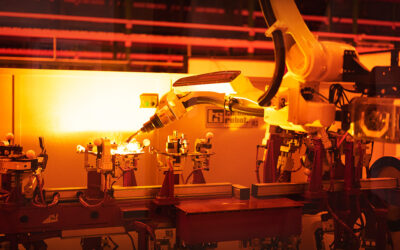International supply chains are incredibly complex and it’s extremely difficult for buyers and customers to know the quality and authenticity of products. Since raw materials are moved around the globe, undergoing multiple production processes along the way, it’s difficult to track exactly what happens at each stage of their lifespan. Blockchain is a secure technology that helps to alleviate some of these issues in supply chain management.
Jaguar Land Rover, along with key partners in both academia and tech services, recently tested the use of blockchain technology to track and map the supply chain of leather used in automobile manufacturing. The British carmaker hopes that by leveraging blockchain technology, the car industry will be about to move towards more transparency and sustainability, particularly in the procurement and processing of leather.
Using this technology, supply chains can be accurately measured and tracked. With a blockchain, it isn’t possible to modify information once it has been captured on the system. As a leading supplier of car parts to manufacturers both locally and internationally, Formex supports innovation in supply chain management. Rapid digitisation is taking place across all aspects of manufacturing, and the blockchain will certainly improve supply chain management, benefiting all stakeholders in automotive manufacturing.

Blockchain technology for supply chain management
A blockchain is a system of recording information. It is a decentralised database that is managed by multiple participants. This means that nobody is in charge of the information. Instead, it is run by the people who use it. This helps to improve communication and coordination between partners and gives everybody access to all the information that is stored on the blockchain record.
Each piece of information on the blockchain is called a “block.” Every subsequent piece of information is added to this initial block and is verified by the participants on the network. This creates a list of records that is linked together. Once data has been recorded, it cannot be reversed or changed. All records of information are individually encrypted, making them highly secure. It is near impossible to change or hack a blockchain system.
Blockchain technology is considered to be the missing link in effective supply chain management. It prevents mistakes in inventory data, is tamperproof, and means that counterfeits can be traced to their source.
A number of industries are using blockchains in their supply chain management. Walmart tested blockchain in tracing pork in China. It has been used by IBM and Maersk to improve cross-border transactions. Unilever, Tyson and Nestlé are also using blockchain to track their supply chains from source to shelf.

Jaguar Land Rover trials blockchain technology
In order to test the application of a blockchain in supply chain management, the UK carmaker teamed up with The University of Nottingham, Bridge of Weir Leather Company, a British leather manufacturer, and Circulor – a leader in supply chain traceability. In this trial, researchers used the blockchain to track compliance and assess the leather supply network’s carbon footprint.
Partnering with the Bridge of Weir Leather Company allowed Jaguar Land Rover to track their leather, from raw material to finished product. In order to initiate the blockchain, a “digital twin” of the raw material is generated. This allows the material to be tracked electronically as it travels along the supply chain.
Using GPS data, QR codes and biometrics, the movement of the raw material is digitally tracked using the blockchain. From tanneries to upholsterers, individual pieces of leather can be traced at every stage of the supply chain. Since all cattle on EU and UK farms are individually identified, the researchers can ensure that leather is sourced from local farms where the animals are grass-fed.
This method can be implemented across Jaguar Land Rover’s international supply chain and can be used by other industries too. The blockchain record allows greater transparency and falls in line with Jaguar Land Rover’s sustainability goals of creating zero-carbon and zero-waste in the manufacturing process.

Moving towards sustainability and transparency
Without the blockchain, it is difficult to investigate when malpractice has taken place in international supply chains. A blockchain gives all participants access to the same information, thus reducing communication errors and improving transparency. All records are kept in a secure digital platform, so this reduces the time spent on validating data and leads to improved quality and lower costs.
Jaguar Land Rover has been working towards greater environmental accountability, which includes offering consumers more sustainably-sourced materials for the interior of their vehicles. Natural fibres, such as a Eucalyptus-based material, are already available on the Range Rover Evoque.
Another sustainable material that the British automaker offers for its interiors is Kvadrat. This is a wool-based textile that is blended with synthetic suede cloth made from recycled plastic. Kvadrat is available on a variety of models and amounts to 53 recycled plastic bottles per vehicle. The Range Rover Evoque, Jaguar I-Pace and Range Rover Velar models all include the option to use Kvadrat.
Improving supply chain management
Using a blockchain allows slow manual processes, often done on paper, to be replaced by highly-secure digital record-keeping. It is possible for customers to know that materials have been sourced sustainably and that the supply chain is authentic.
Dave Owen, executive director of Jaguar Land Rover’s supply chain, explained that the company is restructuring its supply chain to focus on sustainability and transparency. This move forms part of the Jaguar Land Rover’s Reimagine strategy. This global strategy is aimed at collaboration and knowledge-sharing, creating a more agile business model that delivers cleaner energy and more connected services.

Jaguar Land Rover at the forefront of change
International supply chains are in for a complete overhaul in the coming years. Using internet-based technology that links all records together, blockchain is going to significantly improve how goods are sourced, transported and processed. The benefits for the car industry include greater transparency and sustainability.
Formex understands the issues surrounding car part supply chain management, especially in the South African context. Being able to trace materials from their origin to their end-product will streamline the supply chain, making it easier for manufacturers to know when materials will be delivered, where they were sourced, and whether their quality can be assured. For more information about our products and components, please leave us a message.
Formex Industries is a metal forming and assembly company that supplies a variety of complex products to the local automotive industry and the export market. The company is based in the Nelson Mandela Bay metropole, South Africa’s foremost region for automotive manufacturing and export.
Formex is a supplier with 69% black ownership, of which 37% are black women. The company is owned by Deneb Investments Limited – a subsidiary of Hosken Consolidated Investments Limited (HCI) – one of South Africa’s biggest true B-BBEE companies listed on the Johannesburg Stock Exchange (JSE).
Follow us on Facebook for the latest industry news and features relating to our products and services.





